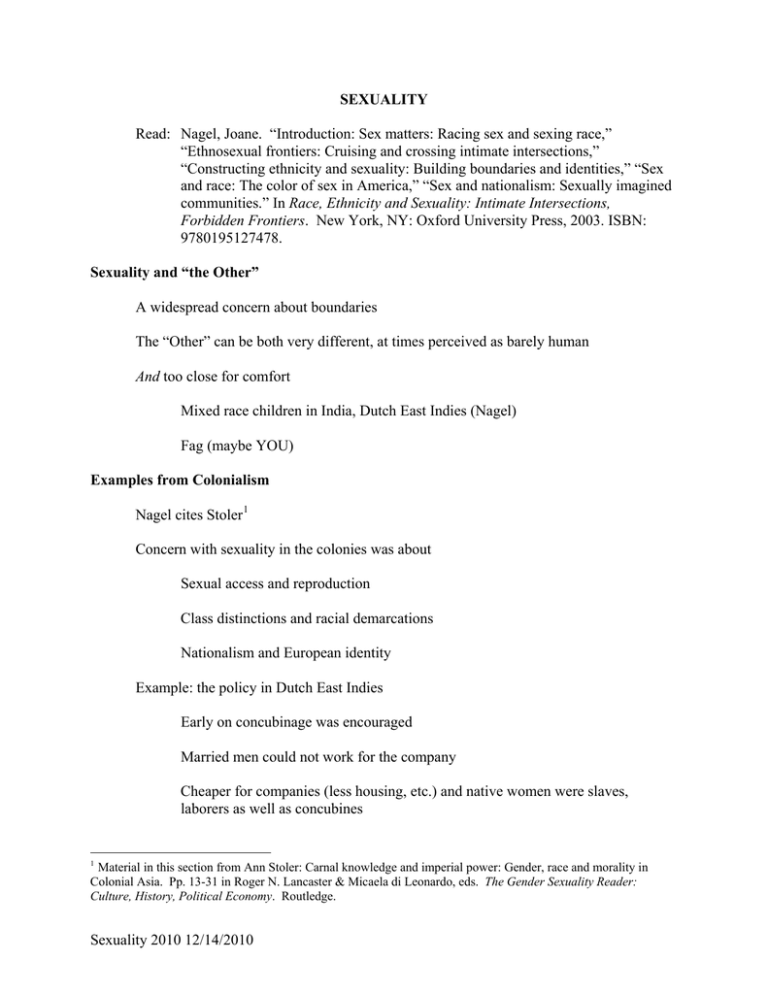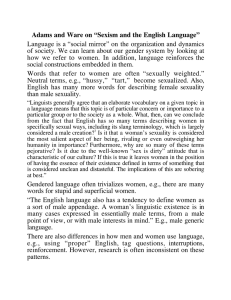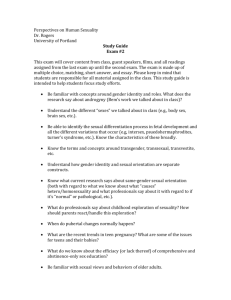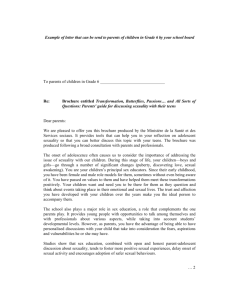
SEXUALITY
Read: Nagel, Joane. “Introduction: Sex matters: Racing sex and sexing race,”
“Ethnosexual frontiers: Cruising and crossing intimate intersections,”
“Constructing ethnicity and sexuality: Building boundaries and identities,” “Sex
and race: The color of sex in America,” “Sex and nationalism: Sexually imagined
communities.” In Race, Ethnicity and Sexuality: Intimate Intersections,
Forbidden Frontiers. New York, NY: Oxford University Press, 2003. ISBN:
9780195127478.
Sexuality and “the Other”
A widespread concern about boundaries
The “Other” can be both very different, at times perceived as barely human
And too close for comfort
Mixed race children in India, Dutch East Indies (Nagel)
Fag (maybe YOU)
Examples from Colonialism
Nagel cites Stoler 1
Concern with sexuality in the colonies was about
Sexual access and reproduction
Class distinctions and racial demarcations
Nationalism and European identity
Example: the policy in Dutch East Indies
Early on concubinage was encouraged
Married men could not work for the company
Cheaper for companies (less housing, etc.) and native women were slaves,
laborers as well as concubines
1
Material in this section from Ann Stoler: Carnal knowledge and imperial power: Gender, race and morality in
Colonial Asia. Pp. 13-31 in Roger N. Lancaster & Micaela di Leonardo, eds. The Gender Sexuality Reader:
Culture, History, Political Economy. Routledge.
Sexuality 2010 12/14/2010
2
Later on there were problems, especially after mixed-race children appeared (too
close)
Such arrangements gave rise to anxiety about possible political agitation
Problems with maintaining white prestige
Feared disloyalty of offspring
Later on in century
Concubinage came to symbolize European fears about the security of European
hegemony and white prestige
So, European women emigrated to colonies
European women seen as fragile psychological, physically
So when they did emigrate to colonies, segregationist standards were what women
deserved
Expanded racism, eugenics came into play;
Women were the solution to fears of “degeneration” as mothers and as
maintainers
Of health, happy households (no prostitutes), good nutrition
A turnaround from notion that the native was stronger, more acclimated
So that mixed-race children represented fears of degeneracy from miscegenation
Europeans should NOT adapt to local food, language, and dress
The notion of superior women developed:
Men came to be considered more susceptible to moral turpitude than
women
Women were thus held responsible for the immoral states of men
Women needed to insulate their men from cultural and sexual
contamination
Remember Linda Gordon’s discussion of Victorian women being seen as morally
superior? Cult of True Womanhood?
3
Native men seen as lustful, uncontrollable urges, aroused by the mere sight of
white women
Such fears unified the often factionalized European community around a common
threat from the outside
Remember lecture outlining possible functions of deviance classifications?
Stoler suggests that accusations often increased
Following heightened tensions within European communities during
strikes and other kinds of unrest
Accusations stood in for a generally perceived need to secure white control,
increase surveillance (of the women, too, of course)
Slavery and its legacy in the U.S.
Theme again of sexual slander
As Nagel says, seeing the other as “lustful” justified enslaving and otherwise
mistreating slaves
This ideology camouflaged castration, rape, breeding programs, sexual servitude
After the Civil War, Nagel suggests—with ample evidence
That white men feared black men in part due to fears of retribution for
mistreatment and abuse of black women under slavery (p. 111)
Men who were lynched: punishing the “uppity” Negro (coming too close)
But lynchings economically motivated as well
Ida B. Wells (p. 113), her friend murdered, economic competition
Movie “Rosewood” based on a true story in Florida: blacks’ houses burned, they
were killed and had to flee for their lives
Accusations about sexuality between black men and white women
inflamed white residents
As happened with lynching mobs elsewhere, economic competition from
black-owned stores was a contributing factor
4
Sometimes the “insult to white women” was totally made up
Famous and transformative case of Emmett Till
14-year-old from Chicago visiting relatives in Mississippi
His mother’s decision to have an open casket galvanized the country
Early 20th century biological theories of race: black men said to be “hyperpotent”
Pascoe: in River High white boys are female to black boys
The male Other seen to be either effeminate or hypersexual
Nagel gives example of native in colonial India as weak, effeminate
“Hyperpotent” a symbol of native cheek, subversion (too close)
Lynchings seldom were the result of actual incidences of rape, but arose in part
out of anxieties about “Black peril”
Also, lynchings seen as a deterrent: to “keep them in their place” (too
close)
Durkheim’s analysis of the functions of crime fits here
Fantasies about black women
“Of course” they were most attracted to white men
And, like the men, “hypersexual”
Nagel’s discussion of early Africa explorers; this theme goes back to Herodotus
and before
Even after emancipation black women still weren’t seen as capable of being raped
Also projection was probably operating in some cases—unacceptable impulses
Perhaps helps explain some of the thousands of lynchings after
emancipation:
If we desire their women, then our women desire them
Unacceptable, so need to maintain tight boundaries and project all agency
onto black males
5
Classic answer to any arguments for equality between the races is sexualized:
Would you want your daughter to marry one? (too close)
The infamous Tuskegee study, which “othered” 400 rural black male tenant sharecroppers in Macon County, Alabama
In the 1920s became subjects in a US Public Health Service study
Not informed they had been switched from status as patient to experimental
subject
But continued to be told they were being treated for “bad blood”
Yearly check-ups, given placebos (dummy pills)
If they tried to get treatment they were hunted down and sent back to
Macon County
Exempted from the draft (where they would be treated) during WWII
Their syphilis left untreated 1932-1970s
Even though treatment options were available, especially after penicillin
appeared
The study was not hidden—over 30 articles about “untreated syphilis in the Negro
male”
Presented to US Congress
Justifications
The disease originally thought to be different among African Americans
Wanted to see if this was true
In this sense, researchers were liberal: wanted to demonstrate that
it wasn’t
Their loose morals created a danger to white population (“germs make no
distinction between skin colors”)
Doing this they can help the black community
6
Woman as the Sexualized Other
Woman as sexual temptress, powerful, general theme
Theme of rape as woman’s responsibility…so powerful as to overwhelm the
strongest man…white men’s vulnerability
Pascoe: black women hypersexualized
Theme of Beauty concealing danger (actually an ugly wicked witch)
The dangerous “other” woman gets too close
Betwixt and between is worrisome, divided loyalties, betrayer
La Malinche legend in Mexico
Movie: “How Tasty Was My Frenchman” 2 and other “Wild Woman”
themes
“Sleeping with the enemy” a frequent theme
Infamous Mata Hari (1876-1917): exotic dancer and alleged spy
Margaretha Geertruida Zelle, Dutch
Took a Malay name, allegedly spied for the Germans, and was
executed by the French
Stage name means sun, literally “eye of the day,” from Malay mata
(eye) + hari (day, dawn)
Nagel mentions punishments like that doled out to the shorn women in
WWII France
Reminds everyone in the nation, not just those labeled “deviant,”
about the presence and power of national boundaries
“Our women” becoming the sexualized “other”:
Miscegenation laws during slavery “manifested an intense concern with
controlling the sexual behavior of white women…” 3
E.g. if a freeborn Englishwomen intermarried with a Negro slave
2
3
Pereira dos Santos, Nelson, 1971. “Como era gostoso o meu francés” (“How Tasty Was My Frenchman”).
Nagel, p. 106 citing Peter Bardaglio.
7
She was to serve her husband’s master until the slave died
She was reclassified as black
Actually this is a very general process
Wife always takes on husband’s status
The New World as female is a familiar image
William Blake’s famous etching of “Europe Supported by Africa and
America”
A dusky, seductive, beautiful young woman ready for the taking (often in a
languorous pose)
Theodore Galle’s “Vespucci ‘Discovering’ America”
Where America is depicted as a naked indigenous woman in a
hammock (illustrated in Nagel)
Also texts like Sir Walter Raleigh’s famous characterization of Guyana as “a
Countrey that hath yet her Maydenhead” 4
Clothing, work, children or native men are nowhere to be seen
Amazonian women also represent the mysterious jungle and Nature herself
The native woman in “How Tasty Was My Frenchman”
Amazons
Symbolize the Amazon forest, unknown terra incognita, challenging, powerful,
dangerous, wild
Strong and independent women warriors of myth and explorer accounts
Independence from men
Additional attributes that also signal power and authority
Such as physical height, and, occasionally, relative whiteness of
skin 5
4
5
Slater, Candace, 2002. Entangled Edens: Visions of the Amazon. Berkeley: University of California Press, p. 34.
Slater 2002, p. 89.
8
Sexualized
Warriors, cut off one breast to be better archers
Reject heteronormativity, reject femininity
Use men only for conception
Or, if not renunciation, they indulge in a variety of sexual
perversions
That invariably challenge European notions of patriarchal authority
Sexualized nationalism
Man as Nation
DISCUSS: virile, fertile; nationalism is masculine
Sexualized Woman as nation
Repository of nationhood DISCUSS
Women represent “us,” our traditions
Algerian resistance, many women fought, afterwards had to return to the kitchen,
veil
Franz Fanon, Algerian revolution, authored Wretched of the Earth
French colonialism represented ripping the veil off (symbolic rape)
Independence required its restoration
Rape theme a frequent tool of nationalism
Nagel: threat of, by Jews, blacks
And of war
Notion of mother/wife/woman as at the heart of the nation
National, imperial and racial duty to produce and rear children
Teach the next generation to be “us”
9
Nazi doctrine
We find this theme in many places
1960s and 1970s Black Panther movement
Women should stay home and raise the next generation of warriors
Sexual orientation and “othering,” heteronormativity
Parallels with colonialism, slavery
“Othering” the “other” via sexuality
Fag discourse:
One way to respond to “fag” being hurled at you is to answer, as Josh did
(p. 61)
“I have a bigger dick than all you motherfuckers”
Assert a commensality between masculine body and masculine identity
This suggests possibilities that they may be uncoupled
As Pascoe indicates, “fag discourse” is a fluid identity
Pascoe: Rebecca says she’s a pimp, not a ho (p. 128)
Heteronormative male loathing of homosexuality is absent for lesbianism
Eroticizing women’s bodies: no matter if they’re lesbians and unavailable,
still available for consumption, fantasies
Pascoe’s interviewee said “girls are pretty, their skin is soft,” not so for
hairy, stinky men
Pascoe (and Adrienne Rich) says eroticizing them makes them nonthreatening, harmless to the sex/gender order
Also, lesbians are correctly imitating the powerful (even though they’re
not supposed to), and homosexual men are seen as rejecting it
Lesbians are outside of heterosexuality and its games, rituals, anxieties—
they can’t be “got at,” can’t be used in boys’ masculinizing projects
10
Gendered/Sexualized Criminal Bodies
Excerpts from Cesare Lombroso (and William Ferrero): The Female Offender. 1897. New York:
D. Appleton and Co.
Very differently from how Lombroso classified men
In part because women commit different kinds of crimes to some degree:
prostitutes vs. “normal” women, “infanticides”
He discovered more “virile physiognomy” (p. 80) “The French women…are
infinitely more typical and uglier, and here I would remark that the more refined a
nation is, the further do its criminals differ from the average (Russia…less
striking [the depraved type])…masculine aspect” (p. 95) “exaggerated frontal
angle, such as one notes in savages and monkeys” (p. 95) “masculine
physiognomy (p. 96) “hips and breasts so rudimentary…she consequently looked
so masculine (p. 96) “virile physiognomy…thus softening the masculine and
savage features” (p. 97) “virility of aspect” (p. 99)
Women prostitutes had the “beauté du diable…[which] disguises and conceals the
betraying anomalies.” (p. 101) “but even the handsomest female offenders have
invariably strong jaws and cheek-bones and a masculine aspect” (p. 102)
“…sexual selection. Man not only refused to marry a deformed female, but he ate
her…” (p. 109)
“The primitive woman was rarely a murderess; but she was always a prostitute…”
(p. 111)
“…and in order to understand the significance and the atavistic origin of this
anomaly, we have only to remember that virility was one of the special features of
the savage women [sic]” (p. 112)
“Examples of this masculine strength may still be found among women in country
districts of Italy, and especially in the islands” (p. 113)
Her normal sister “is kept in the paths of virtue by…maternity, piety, weakness”
(p. 152)
“want of maternal affection” (p. 152) “exaggerated sexuality so opposed to
maternity…In the ordinary run of mothers the sexual instinct is in abeyance…”
(p. 153)
“…atavistic diminution of secondary sexual characters…excessively erotic, weak
in maternal feeling…virile characteristics…” (p. 187)
MIT OpenCourseWare
http://ocw.mit.edu
21A.218J / WGS.170J Identity and Difference
Spring 2010
For information about citing these materials or our Terms of Use, visit: http://ocw.mit.edu/terms.








